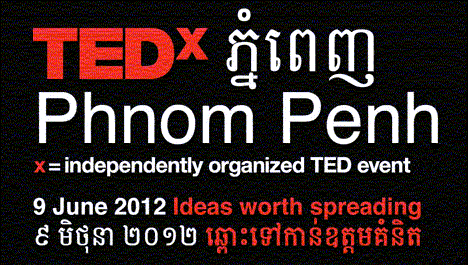TEDxPhnomPenh and Self-Censorship
Jun 10th, 2012 by Jinja
I spent most of my time at #SketchSaturday yesterday, while most of the focus seemed to be on TEDxPhnomPenh. The event had been heavily promoted by the US Embassy, the Phnom Penh Post, and business/NGO partners.
I did keep an eye on the Twitter chatter emerging that day, and was looking forward to seeing the video collations down the road.
Later in the day, a post by KI-Media claimed that the director of Pannasastra University had been threatened regarding TEDxPP content. (The director has publicly denied this was the case.) This was flung to and fro on Twitter.
Due to KI-Media’s hyperbole and overt racism, I’m not an avid reader. (It’s unofficially blocked by most Khmer internet service providers.) In Cambodia’s convoluted media environment, the site does occasionally break/collate news that can’t be found anywhere else.
Just a few hours after the post went up, it was deleted, presumably at the request of the event organizers. (Above is a screen shot of the cached headline; the text portion of it still resides on KI-Media’s Facebook page.)
While I didn’t have the opportunity to take a screen shot of the blog post, I did download the two MP3s accompanying it for later listening – which are available here in mixed English and Khmer.
#1[MP3] & #2[MP3]
Far from censorship, the discussion seems more of a assessment about what content is acceptable in a public forum, by the different parties involved – community members, event organizers, and venue owners. This seems much closer to an issue debated in numerous BarCamps and blogger meetings – the issue of pragmatic self-censorship. In this case, presenting content related to the ‘Boeung Kak 15‘.
This Sunday TEDxPP released an “Official Statement on Yesterday’s Banned Talk” via their Facebook page.

After a few hours it was deleted (image from Google Cache), and a ‘Note on Removed Content’ was added to the TEDxPP site. (See postscript below.)
Technology, Entertainment, Design? Was the ‘Finale Talk’ any of these categories?
I’ll leave it for the pundits to chew over.
Postscript (June 11)
Statement from TedxPhnomPenh – ‘A Note On Removed Content‘
(The Facebook posting has been deleted.)
Statement from Pannasastra University (PDF)
Phnom Penh Post (TEDx Sponsor) ‘Rated X for Content: TEDxPP’
http://www.phnompenhpost.com/national/rated-x-content-tedxpp
TEDxPhnomPenh Facebook Page: Discussion (in comments) between Loun Sovath and TEDxPP Team.
http://www.facebook.com/tedxphnompenh
June 13: Opinions from Gabi Yetter, http://latitudes.nu/a-day-in-cambodia-with-ted/
the PUC Journalism Class, http://pucpenh.tumblr.com/post/24969328615/recap-of-the-tedx-phnom-penh-debacle
Soma Norodom, http://somanorodom.wordpress.com/2012/06/12/hosting-tedxphnompenh-the-best-and-toughest-gig/
Warren Daly (Invisible Agent), http://www.invisibleagent.com/2012/06/13/tedx-phnom-penh-2012-inside-the-pinnacle/
and Jason Rosette (Camerado): http://cameradomoviesandmedia.blogspot.com/2012/06/my-unapproved-phnom-penh-post-comment.html


















As Chris mentioned on twitter, what happend at TEDxPP is exactly why Barcamps usually work better: No agenda, and more important, maximum independency. (Although Bartcamp PP is a bit too close to sponsors already). It is that simple: When you start pleasing the university, the NGOs, the HiSos and sponsors, they will have an (unspoken) influence. TEDxPP isn’t really transparent, and it showed the priority: Itself, not the content, and not the audience. Reminds me of the way NGOs work usually.
There was some great talks, great ideas & innovations.
People spent months preparing their talks and we should concentrate on the positive items they discussed and the positive communications that folks had that day.
The day was about their ideas worth spreading and I for one wish to concentrate on those positives. http://tedxphnompenh.com/speakers/